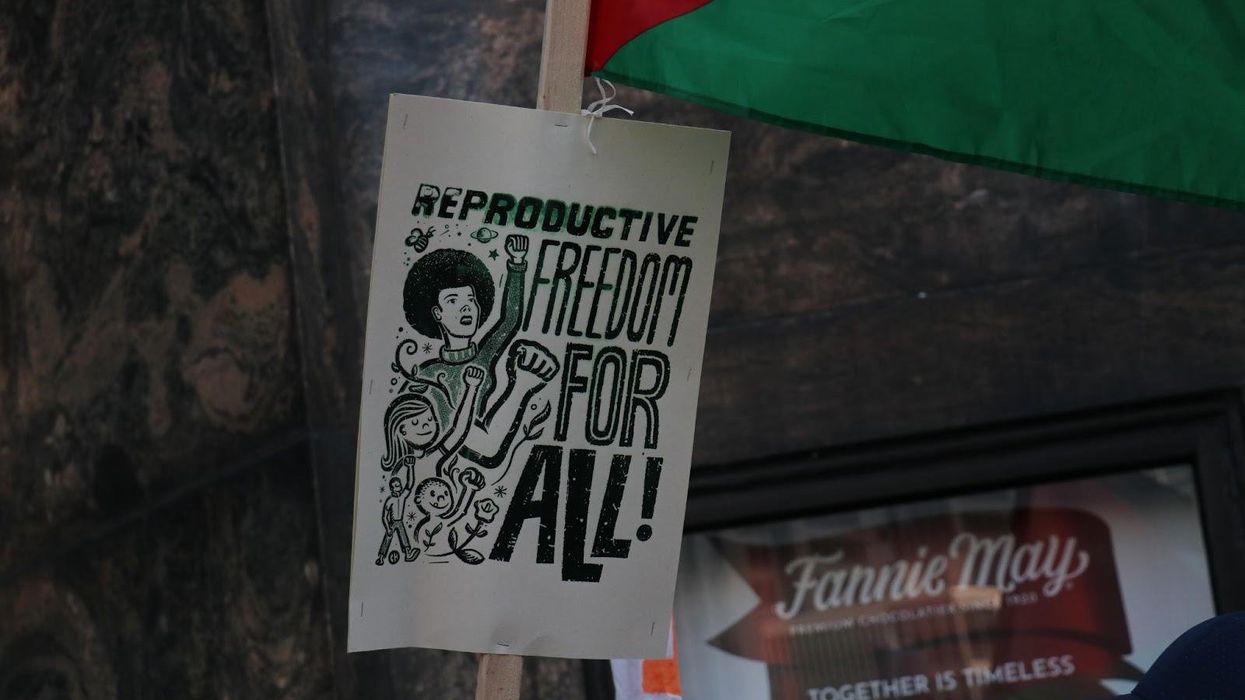Ramakrishnan is a graduate student at Northwestern University’s Medill School of Journalism.
This article is part of a week-long series on the Democratic National Convention, written by graduate students at Northwestern University's Medill School of Journalism who are covering the four-day convention in Chicago.
CHICAGO — A sea of abortion rights signs and Palestinian flags swamped Wacker Drive and Michigan Avenue in downtown Chicago on Sunday, punctuated by the black, blue and yellow of police officers’ uniforms and vests. Signs reading “Reproductive Freedom for All” were attached to the masts of Palestinian flags and abortion rights activists wore t-shirts calling for a ceasefire in Gaza.
Sunday’s protest was the first of many shadowing this week’s Democratic National Convention. Organized by the Bodies Outside of Unjust Laws coalition, it brought together supporters of two different causes who have found common ground. The march came a week after the coalition — made up of several abortion rights, LGBTQ+ and pro-Palestinian groups — received a permit, which it had to sue the city to obtain.
Despite reproductive rights being one of presidential candidate Kamala Harris’ talking points, there were posters that read “Baby killer Kamala” speaking to the thousands of Palestinian children killed in Gaza since Hamas-led groups killed and kidnapped Israelis on Oct. 7, 2023. Protesters expressed disappointment in the Democratic Party for not doing enough to protect abortion rights even though they acknowledge the Republican Party is the bigger enemy on this issue.
The march began with a rally on Wacker Drive beside the Chicago River. Speakers addressed those gathered and the sound of drum beats filled the air.
Criage Althege, a longtime resident of Chicago, sat curbside and held a sign that read “Stop the Genocide!Stop Apartheid! Ceasefire Now!”
Althege, wearing a purple top and skirt, shiny black boots and dark sunglasses, seemed to enjoy herself despite not being at the heart of the action. She is a member of Chicago for Abortion Rights, one of several groups that organized Sunday’s protest.
“I believe it all ties together from choosing to have children or not. It’s about bodily autonomy,” Althege said. “Right now, people in Gaza are being bombed with their children and that is not bodily autonomy.”
Several abortion rights groups present that day expressed support for Palestinians, called for an arms embargo and an immediate ceasefire, and demanded Harris include it in her policy proposals as she campaigns. ( Israel has agreed to the latest ceasefire proposal brokered in part by the United States, but Hamas has not done so.)
Guy Miller was part of the 1968 protests at the DNC that still cast a shadow over this city and the 2024 convention.
“Not that I have faith in the Democratic Party to accomplish anything, but they are here and we’re a major force. They were not able to pass an abortion-granting law and they’re complicit in the ongoing genocide and we have to let them know what we think,” said Miller, who is also part of Chicago for Abortion.
As the protesters marched along Michigan Avenue, onlookers stopped to catch moments on their smartphones. Lines of bicycle-riding law enforcement officers formed barricades on either side of the march.
One protester said she had a lifesaving abortion and that, irrespective of the candidate, people need to talk about abortion rights every year. Her friend then handed over a box of “morning after” pills with a smile.
Some groups at the protest had traveled from other states, like Abortion Access Front, which is based in Mississippi.
AAF’s communication director, Cara McLane, was flanked by four protesters cosplaying as abortion pills mifepristone and misoprostol.
“This is Mife and Miso-tones – an all-pills singing group giving out factual information on abortion medication,” McLane said.
The group’s goal is to educate the public on how abortion medication works, what the drugs are called and how they can be accessed.
“We use joy and humor to get people interested to talk about something that could be uncomfortable to discuss,” McLane said.
In October 2023, the International Planned Parenthood Foundation released a statement saying its only clinic in Gaza was destroyed in an Israeli airstrike. “Over 50,000 pregnant women will be forced to give birth with no electricity or medical supplies in Gaza in the coming months, risking life-threatening complications without access to delivery and emergency obstetric care services,” the statement said.
Protesters said they would continue demonstrating after the election irrespective of its outcome.
“It was amazing to see the diversity of people who attended the protest. We had Palestinian feminists, labor workers, social workers and others! It felt good,” said Lina Loew, a leader of Chicago for Abortion Rights.




















 From left to right: Gabriel Cardona-Fox, Bud Branch, Joe Concienne
From left to right: Gabriel Cardona-Fox, Bud Branch, Joe Concienne 